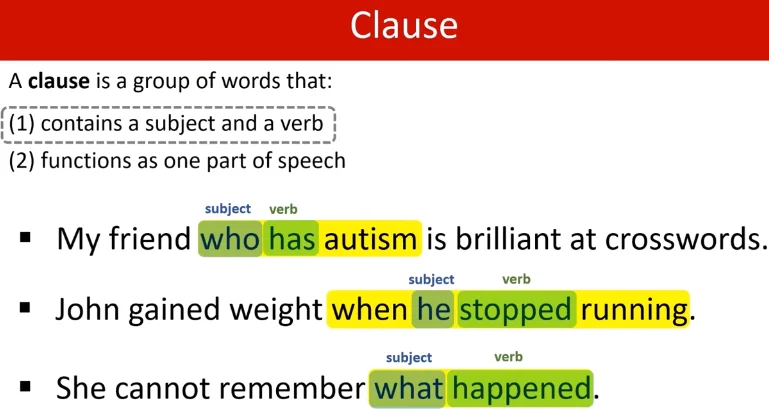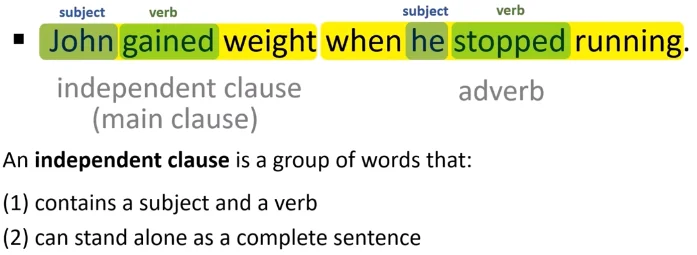A clause is a group of words that has its subject and a verb. Then, it functions either as an independent or a dependent clause. It also functions as one of the parts of speech. So, we can categorize clauses in terms of Main clauses (Independent) or subordinate clauses (Dependent).
The Main clause can stand alone independently (without the support of a subordinate clause). While a subordinate clause cannot stand alone on its own; rather it depends on the support of the Main clause to give complete thought.
| No. | Main Clause | Subordinate Clause |
| 1. | Independent | Dependent |
| 2. | Stands alone (self-supporting) | Cannot stand alone |
| 3. | Gives complete thought and makes sense | Without support, doesn’t make sense |
| 4. | Takes no conjunction | Takes a conjunction |
Examples of Clauses in Use
In the following sentences, the bold parts are showing Main (Independent) Clauses, while the unbolded parts are subordinate (Dependent) clauses.
- Before the sun rises, I will get up.
- When I was a child, my mother looked after me.
- The people always thanked us, whenever we helped out them.
- The red signal was on, so we stopped by it.
- Though she is an honest officer, she doesn’t show up to others.
- I saw my friends going to the museum, after twelve o’clock.
- Kim will succeed one day, because he is consistent and hardworking.
- You will not be paid, until you complete the task.
- As a teacher, it is my obligation to teach you first.
- We are going to the zoo, since we have enough time.
- I will congratulate you, if you qualify for this post.

Types of Clauses
These are the two kinds of clauses given below.
- Independent
- Dependent
An independent clause is also called the main clause. Because it shows a complete thought. And, it can stand by itself as an independent sentence. Whereas a dependent clause is also called a subordinate clause. Because it neither expresses a complete thought nor can stand alone.
Independent Clauses
An independent clause is a group of words that contains a subject and a verb and can stand alone as a complete sentence.

Example. 1
Johnny gained weight when he stopped running.
Here, “Johnny gained weight” is a complete sentence, it can stand alone independently.
Example. 2
We will escape when the sun rises.
“When the sun rises” is an example of (Main) independent clause, there’s subject = we, there’s verb = will escape. Being the main clause, it could stand alone as a sentence.
Example. 3
She cannot remember what happened.
Here, “She cannot remember” is the main clause, and, “what happened” is an example of a subordinate clause.
Example. 4
After the party, all the people went to their homes.
This complex sentence has a subordinate clause = “after the party”, and the main clause= “all the people went to their home“.
Dependent Clauses
A dependent clause is also called a subordinate clause. Because it neither expresses a complete thought nor can stand alone. Also, it has conjunction that links it with the main clause.

Here, the bold parts of the sentences are showing Dependent clauses below.
Example. 1
As the police arrived, the thief escaped at once.
In this sentence, the first part is bold= “As the police arrived“, is subordinated to the main clause, = “the thief escaped at once”.
Example. 2
We need to stay here until the rain stops.
In this sentence, the second part is bold= “until the rain stops“, is subordinated to the main clause, = “We need to stay here”.
Instead of going to the police station, we should solve this issue by ourselves.
In this sentence, the second part is bold= “Instead of going to the police station“, is subordinated to the main clause, = “we should solve this issue by ourselves”.
Functions of Clauses
There are different functions of clauses according to the parts of speech like a Noun clause, Adjective clause, Adverb clause, etc.
Noun Clause
She cannot remember what happened.

Well, this is functioning as a noun clause because = “what happened” is functioning as a noun and that is a noun clause.
Adverbial Clause
John gained weight when he stopped running.

This clause is functioning as an adverb, it modifies the verb= gained. So, this is an adverbial clause and finally, let’s get back to that third.
Adjective Clause
My autistic friend is brilliant at crosswords.

Well, this is an adjective clause. Because it describes the noun friend to make it more specific. That is the definition of an adjective. So, the clause is functioning as an adjective.
A girl, who visited my school won the prize.
= “who went to my school” is an adjective clause.
When an adjective clause is required to identify its noun then there are no commas. But when an adjective clause gives just additional information about its noun then there are commas. So, in the top example, we don’t know which boy we’re talking about until we read the adjective clause.
Mr. Carroll, who went to my school = is just additional information. But when an adjective clause is just additional information it is offset with commas. An adjective clause that identifies its noun is called a restrictive clause. An adjective clause that is just additional information about its noun is called a non-restrictive clause.
Use of Conjunctions in Clauses

The part of the sentence that contains a dependent clause starts with subordinating or coordinating conjunction such as: when, after, but, so, for, because, if, since, though, although, even though, before, until, unless, that’s why, and whenever, therefore, afterward, etc.
